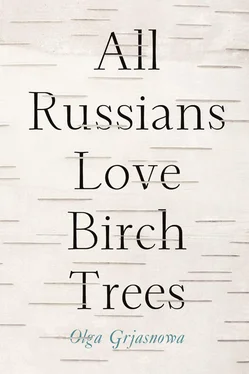According to Jewish faith the soul leaves the body at the time of death, but sticks around nearby until the body has been buried. Therefore the body must not be left alone. But Elisha wasn’t Jewish, and I wasn’t religious. Somebody yelled my name. At some point the nurse and two doctors, whom I didn’t know, were standing in front of me. I hadn’t even heard them unlock the door. One of them had a broad back and a weathered face and reminded me of the Russian swimmer Alexander Popov. I’d been sitting next to my mother in front of the TV when Popov won gold at the Olympics in Barcelona. The doctor pushed me into a chair.
I left the hospital, crossed the narrow street, and waited at the bus stop. Birds were chirping and the bus was on time. The bus driver said hello and I sat down in the last row and pressed my face against the scratched window. The landscape was still there. Long rows of parked cars, small houses, well-tended gardens. Here and there a tree.
I got off at the first subway stop. Went down, threw the trash from my pockets into an overflowing bin that was swarming with flies. I threw up. I wiped my mouth. A few punks took a piss onto the tracks and laughed. The subway came and the punks lifted their backpacks and got on, one after the other. The air in the car was stuffy. The stops cycled in and out, and along with them the passengers, most of whom had their backs turned to me. I was in front of my door and then in the hallway of the apartment. I hung my keys on the hook next to the door and took off my shoes. In the bathroom I was hit by a wall of warm, moist air. The water was scalding hot. The drain cover was full of blond hair. His hair. There were unopened letters on the kitchen table that were addressed to Elisha. Under the pillow was his T-shirt. There was a smell of his sweat and of milk in the air, although Elisha had very rarely smelled sweaty and never smelled like milk. After a while, only the scent of sour milk would remain. I coiled up and everything around me began to spin. I could feel the sickness rising. I staggered into the bathroom and threw up next to the toilet. My circulatory system, my knees and palms, all signaled that my body was throwing in the towel. I trembled and lay back down in bed, and nothing seemed more urgent to me than sleeping.
My mother took care of everything. She took care of Horst and Elke, the phone, the formalities and the rest. She lit a candle next to Elisha’s photo and covered the mirrors. I lay in bed, didn’t change my clothes, and stared at the ceiling. Sometimes Mother came in, sat down next to me, and emptied out the bucket next to the bed. Since I couldn’t eat, I only threw up bile.
The Talmud demands that one remember the dead. If I’d had it on hand I would have thrown it into a fireplace. But it was in some box next to a Schindler’s List videotape. I wanted to remember everything. His face and his body. Under no circumstances did I want to forget how he held me in his arms, how his lips felt on my skin, how he smiled and how we fell asleep next to each other. How we talked on the phone in the evening when we were apart. Forgetting became my biggest fear. I lay in bed, the curtains drawn, and on the nightstand there was the lit candle in front of his photo. If I closed my eyes I saw his face and if I kept them closed for too long I saw the face of a young corpse in a light blue gown. Her cavernous eyes, blood dripping from her abdomen. Before the images could merge, I blinked and took a sip of water. Then I could see Elias again. I remembered the way my body fit perfectly into his. I thought of his voice, his hands, and how I had found him in a small, smoky apartment.
The Croatian hosts had slowly bobbed their heads in sync with the Slavic hip-hop. I had a cigarette and a glass of vodka in hand and combed through the rooms searching for people I knew. A recent high school graduate pulled me into the kitchen, wanted me to touch his biceps. The food spoke of the hosts’ loyalty to the Balkan snack bar owned by their aunt. The living room was bursting with people. Elias sat on the sofa, flirting aggressively with Tuba. He had a girly face with sunken cheeks and high cheekbones. Dimples formed at the edges of his smile. A harmless-little-boy haircut. His clear, even skin and a delicate net of freckles around his finely cut nose completed the picture. I liked tall, slender men and faces dominated by noses, and had spent far too long watching him already.
Tuba brushed her hair out of her face, bracelets rattling, and took another swig from the beer bottle. In the process, she stuck out her tongue a little and briefly licked the bottleneck. Suddenly she waved.
“Masha!”
I slowly wove my way through the dancing crowd. Somebody spilled beer on my shoe and apologized with a nod.
“Sweetheart, how are you? This is Elias.” Tuba looked at me and Elias, alternatingly, and played with her hair — seemingly lost in thought. She twirled a strand of hair around her index finger, tightened it, and let it bounce again. Then she asked me, “Are you here with Cem?”
“Yes, but I haven’t seen him in an hour.”
“I’ll go look for him.” Tuba disappeared. I sat down next to Elias and sat up straight. The situation was a little awkward for both of us. At first we just sat there in silence. Then I asked him where he was from. He spoke of Dresden, Hamburg, and Berlin, of fishing and architecture, of French films, the new exhibition at the modern art museum, of soccer and the mole behind my left ear.
We left the party together. It was drizzling and Elias asked me whether he could give me a ride home on his bike. He studied me so intensely and seriously, as if he wanted to learn me by heart. I took the night bus. As I was regretting my decision in solitude at the bus stop, it began to hail.
Three weeks later I ran into Elias on the tram. Next to us stood a boy with a transparent bag in his hand. In the bag swam a goldfish. Elias and I looked at the boy, puzzled, but he paid no attention to us. I wanted to slip Elias my number, but he got off too soon.
Over the next weeks I constantly thought of him. Then I read in the newspaper about an exhibition in the Staedel school. I even bought a new dress, but it was too cold to take off my coat. Elias stood in the corner, leaning on the bar, cigarette hanging from the corner of his mouth. Next to him was a girl. Red short skirt, coralline lips. A pretty girl, with immaculate skin and immaculate legs. When I saw her, I knew I had no choice but to accept our German girl and her immaculate legs. I stormed out. He caught me at the entrance, by the sleeve. We went back in. He bought me a beer and I was afraid of saying something stupid. And then he said the only thing that most pictures need to become art is empty walls. I grew increasingly nervous. I liked his nose and wasn’t thinking anymore about Sami, who had returned to California a couple of months ago.
The ash of my cigarette left burn marks on the sheet. I lay in the half-empty bed and saw the corpse of the young woman in the blue gown hit the pavement directly in front of my feet. Eyes rolled up, bleeding abdomen. I freed myself from my father’s grip and ran over to the woman. Her dress was soaked with blood that pooled around her on the asphalt and ran up to my shoes. Dyed them red.
My mother greeted Cem with overwhelming geniality and made him coffee.
Cem sat down at my bedside and said that he and his friend had hired professional mourners in Greece for Elias, who during the next forty-eight hours would wail over Elias’s death. I could watch them over a live stream on the Internet. He had set up a YouTube channel specifically for that purpose. He pulled a laptop from his bag and on the screen I saw two veiled old women who did nothing but sit on two white plastic garden chairs in an almost empty room. Cem stared at the screen disappointedly and cursed in Turkish. Then he called Konstantin, whom I heard cursing on the other end of the line as well. Konstantin in turn must have called somebody in Greece, as a mere fifteen minutes later the professional mourners got to work: they screamed, wailed, and sobbed. We watched them for a while and they kept repeating one sentence over and over. At least it sounded like one sentence to us. I asked Cem what it meant but he didn’t know. We called Konstantin again.
Читать дальше












